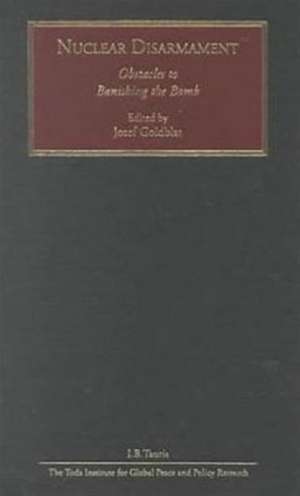Nuclear Disarmament: Obstacles to Banishing the Bomb: Humanity and Security and Global Governance
Editat de Jozef Goldblaten Limba Engleză Hardback – 3 aug 2000
Preț: 774.89 lei
Preț vechi: 1028.79 lei
-25% Nou
Puncte Express: 1162
Preț estimativ în valută:
148.27€ • 161.57$ • 124.94£
148.27€ • 161.57$ • 124.94£
Cartea nu se mai tipărește
Doresc să fiu notificat când acest titlu va fi disponibil:
Se trimite...
Preluare comenzi: 021 569.72.76
Specificații
ISBN-13: 9781860645761
ISBN-10: 1860645763
Pagini: 296
Dimensiuni: 156 x 234 x 27 mm
Greutate: 0.58 kg
Editura: Bloomsbury Publishing
Colecția I.B.Tauris
Seria Humanity and Security and Global Governance
Locul publicării:London, United Kingdom
ISBN-10: 1860645763
Pagini: 296
Dimensiuni: 156 x 234 x 27 mm
Greutate: 0.58 kg
Editura: Bloomsbury Publishing
Colecția I.B.Tauris
Seria Humanity and Security and Global Governance
Locul publicării:London, United Kingdom
Notă biografică
Jozef Goldblat is Vice President of the Geneva International Peace Research Institute.
Cuprins
Part 1 The imperative of nuclear disarmament: toward a nuclear weapon-free world as a prelude to a war-free world, Joseph Rotblat; the process of nuclear disarmament, Sverre Lodgaard; ban on use - an essential condition for nuclear disarmament, Jozef Goldblat. Part 2 Arms control prerequisites for nuclear disarmament: convincing the nuclear-weapon states to disarm - the problem of conventional forces, Jonathan Dean; the elimination of chemical and biological weapons, Graham S. Pearson; possible responses to chemical and biological weapon attacks, Lawrence Scheinman; transparency in armaments and other confidence-building measures, Herbert Wulf. Part 3 Conditions for regional denuclearization: conditions in the Middle East, Yair Evron; conditions in the Persian Gulf; conditions in South Asia - as viewed by an Indian, Jasfit Singh; conditions in South Asia - as viewed by a Pakistani, Malik Azhar Ellahi; conditions in Northeast Asia, Toshiyuki Toyoda; conditions in a divided country - the case of Korea, Hiroharu Seki. Part 4 Political, technological and economic requirements for nuclear disarmament: NATO-Russia relations in a post-Cold War Eurasia, Alexander Nikitin; the role of non-governmental organizations in nuclear disarmament, David Krieger; conversion of the nuclear weapons complex - potential economic and social fallout, Joseph Di Chiaro III; domestic dimensions of disarmament - the case of China, Yitzhak Shichor; multilateral fora as an institutional link between nuclear and non-nuclear disarmament, Vladimir Petrovsky. Part 5 Summary and conclusions: summary and conclusions, Jozef Goldblat.


